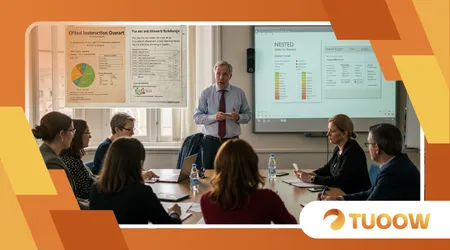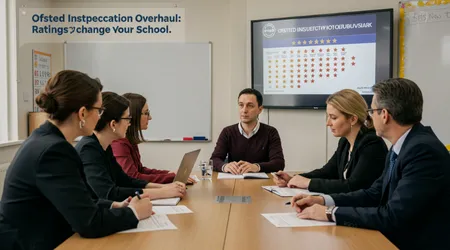Ofsted Inspection Overhaul: How New ‘Report Card’ Ratings Could Change Your School

Ofsted Inspection Overhaul signals a seismic shift in how England’s schools are judged, moving away from blunt single-word ratings to nuanced report cards.
This transformation, set to roll out in November 2025, aims to paint a fuller picture of school performance for parents, educators, and communities.
Gone are the days of “Outstanding” or “Inadequate” labels that oversimplify complex institutions. Instead, schools will face a detailed, multi-faceted evaluation, shining a light on strengths and areas needing improvement.
This change, driven by years of criticism and the tragic case of headteacher Ruth Perry, whose suicide was linked to an Ofsted inspection, responds to calls for a fairer system.
But will this new approach truly deliver clarity and fairness, or merely swap one set of pressures for another? Let’s dive into what the Ofsted Inspection Overhaul means for schools, teachers, and parents.
The reforms stem from Ofsted’s “Big Listen” consultation, which gathered thousands of voices from educators, parents, and students.
The feedback was clear: single-word judgments were reductive, stressful, and often unfair. Now, Ofsted promises a collaborative, context-sensitive model.
This blog post unpacks the Ofsted Inspection Overhaul, exploring its new report card system, implications for schools, and what stakeholders can expect.
We’ll examine the five-point grading scale, the focus on inclusion, and practical steps schools can take to prepare. With real data, examples, and insights, this is your guide to navigating the future of school inspections.
The New Report Card System: A Game-Changer for Transparency
Picture a school report card not unlike a student’s, but instead of grades for maths or English, it evaluates leadership, inclusion, and safeguarding.
The Ofsted Inspection Overhaul introduces report cards that replace single-word judgments with a five-point scale: “exemplary,” “strong,” “secure,” “attention needed,” and “causing concern.”
These grades apply to eight key areas, offering a granular view of a school’s performance. Parents will no longer rely on a single label but will see a detailed breakdown of strengths and weaknesses.
This shift addresses long-standing criticisms. A 2024 Education Committee report found that 90% of teachers felt single-word judgments failed to reflect their school’s true quality.
The new system aims to provide richer insights, especially for parents navigating school choices.
For instance, a primary school in Leeds might score “exemplary” in safeguarding but “attention needed” in curriculum delivery, giving parents a clearer picture than a blanket “Good” rating.
Yet, complexity brings challenges. Some headteachers, like Pepe Di’Iasio of the Association of School and College Leaders, argue the new system could overwhelm schools with its multiple grades.
++ Cost of Living Impact on University Students in the UK
Will parents, accustomed to simple labels, find these detailed reports accessible? Schools must now communicate their report card results effectively to avoid confusion.
The report cards also promise to incorporate contextual data, such as student demographics and attendance rates.
This could benefit schools in disadvantaged areas, where raw exam results don’t tell the full story.
For example, a Birmingham secondary school serving a high proportion of SEND (Special Educational Needs and Disabilities) students might now be judged more fairly, with inspectors considering local challenges.

A Collaborative Inspection Process: Less Fear, More Dialogue
Imagine an inspection not as a looming threat but as a constructive conversation. The Ofsted Inspection Overhaul emphasizes collaboration, moving away from the top-down model that left teachers dreading the inspector’s call.
From November 2025, inspectors will work closely with school leaders, factoring in contextual challenges like socio-economic factors or staff shortages.
This shift aims to reduce the fear that Ben Newmark likened to “Voldemort” in his 2025 PMT Education article.
Take Parkview Primary, a fictional school in Manchester. Under the old system, a dip in test scores might have branded it “Inadequate,” ignoring its diverse student body.
Now, inspectors might discuss with staff how they’ve adapted the curriculum for English-language learners, leading to a fairer evaluation.
This collaborative approach could rebuild trust, but only if inspectors are trained consistently, a concern raised by unions like the NASUWT.
Also read: Skills England Launch: What the New Agency Means for Apprentices and Colleges
Another change is the end of ungraded inspections for state-funded schools. Every inspection will now be graded, ensuring accountability but potentially increasing pressure.
Schools graded “attention needed” will face monitoring visits to track improvements, a move Ofsted claims will drive standards without punitive measures. Yet, critics worry this could still feel like a sword hanging over schools’ heads.
The removal of subject-specific “deep dives” in ungraded inspections, replaced by broader “focus areas,” also aims to ease burdens.
For instance, instead of dissecting a single subject like history, inspectors might explore humanities as a group, reducing stress for subject leaders.
However, schools must still prepare robust evidence across these areas, which could stretch resources thin.
Prioritizing Inclusion and Safeguarding: A Focus on Vulnerable Learners
Every child deserves an education that meets their needs, yet SEND students and disadvantaged learners often fall through the cracks.
The Ofsted Inspection Overhaul places inclusion and safeguarding at its core, with separate evaluations for these areas.
This responds to feedback from the Big Listen, where parents of SEND children described a “broken” system.
Ofsted’s new toolkit will assess how schools support vulnerable learners, ensuring their progress isn’t an afterthought.
Read more: Historic UK Curriculum Shift: First Aid Training National Rollout in Scotland
Consider Greenhill Academy, a fictional London school with a high SEND population. Under the new framework, inspectors might praise its tailored reading programs but flag gaps in staff training for autism support.
This nuanced feedback could guide improvements without condemning the school outright. Ofsted’s focus on inclusion aligns with Tom Rees’s view, chair of the DfE’s Expert Advisory Group, who called it “a fundamental principle of schooling.”
Safeguarding now gets a standalone assessment, a change spurred by cases like Ruth Perry’s, where minor issues led to harsh judgments.
If safeguarding concerns are fixable within three months, inspections may be suspended, giving schools time to act.
This could prevent unfair “Inadequate” ratings, but schools must maintain meticulous records to prove compliance.
However, disability campaigners question whether Ofsted’s inclusion criteria are robust enough. The new system must avoid vague metrics and ensure SEND students’ needs are measurably met, or it risks being performative.
Schools will need to invest in staff development to meet these expectations, which could strain budgets in underfunded areas.
Preparing for the Overhaul: Practical Steps for Schools
How can schools thrive under this new regime? Preparation is key, and the Ofsted Inspection Overhaul demands proactive steps.
Schools should start by reviewing Ofsted’s consultation document, available until April 2025, and engaging in focus groups to shape the final framework. This ensures their voices influence the process, fostering ownership over the changes.
Next, schools must align their practices with the new evaluation areas. For example, a Bristol secondary could audit its inclusion strategies, ensuring SEND students access the full curriculum.
Detailed records, especially for safeguarding and attendance, are critical. Ofsted’s toolkits, promised for September 2025, will outline clear criteria, helping schools self-evaluate.
Training staff is another priority. The Ofsted Inspection Overhaul requires inspectors to undergo four days of online training, as reported by Schools Week in July 2025.
Schools should mirror this by upskilling teachers, particularly in areas like inclusion and data management. A Yorkshire primary, for instance, might run workshops on contextual data analysis to prepare for inspections.
Finally, schools should communicate changes to parents early. Hosting open evenings to explain report cards can prevent misinterpretation.
By proactively addressing these areas, schools can turn the overhaul into an opportunity for growth rather than a source of stress.
Challenges and Criticisms: Is the Overhaul Enough?
No reform is without its skeptics, and the Ofsted Inspection Overhaul has sparked debate. Headteachers like Pepe Di’Iasio argue the new system, with its eight graded areas, could be “worse” than the old one, piling pressure on an already stretched workforce.
The Guardian reported in February 2025 that unions see the changes as “demoralizing,” fearing they’ll exacerbate teacher retention issues, with 12.3% of teachers leaving the profession in 2023, per DfE data.
The complexity of report cards also raises concerns. Parents accustomed to simple labels might struggle to interpret eight grades, potentially undermining trust.
Ofsted’s promise of clearer reports hinges on effective communication, but lengthy documents could alienate busy families. Will a single mother in Liverpool have time to decode a multi-page report?
Moreover, funding remains a hurdle. The Institute for Fiscal Studies notes that Further Education funding remains below 2009 levels, and schools face similar constraints.
Without resources to implement changes, schools may struggle to meet Ofsted’s expectations, particularly in inclusion and staff training.
On the flip side, supporters like Education Secretary Bridget Phillipson argue the overhaul raises standards by focusing on “all the areas that matter.”
The emphasis on contextual data could level the playing field for schools in challenging areas. Yet, only time will tell if the system delivers fairness without overwhelming schools.
The Bigger Picture: Rebuilding Trust in Ofsted

Trust in Ofsted has been shaky, with the Ruth Perry tragedy highlighting the human cost of high-stakes inspections. The overhaul aims to mend this by fostering collaboration and transparency.
By involving stakeholders through consultations and training, Ofsted signals a commitment to listening. But rebuilding trust requires more than policy tweaks it demands cultural change.
Schools can play their part by embracing the overhaul as a chance to showcase their strengths. For example, a rural Norfolk school might highlight its community engagement, even if exam results lag.
By focusing on narrative over numbers, the new system could humanize inspections.
Parents, too, must adapt. The shift to report cards empowers them with detailed insights but requires effort to understand.
Ofsted’s webinars and briefings, planned for autumn 2025, will help bridge this gap. Ultimately, the overhaul’s success hinges on whether it fosters a culture of improvement rather than fear.
A Snapshot of the New Grading System
To illustrate the Ofsted Inspection Overhaul, here’s a table summarizing the new five-point grading scale and its application across key areas, based on Ofsted’s February 2025 consultation document:
| Grade | Description | Example Implication |
|---|---|---|
| Exemplary | World-class practice, shareable | School recognized for innovative inclusion |
| Strong | High-quality performance | Consistent curriculum delivery |
| Secure | Meets expectations reliably | Adequate but not standout safeguarding |
| Attention Needed | Requires improvement | Gaps in teacher training identified |
| Causing Concern | Serious issues needing urgent action | Poor attendance monitoring flagged |
This table shows how schools will be evaluated across areas like leadership, quality of education, and inclusion, providing a clearer framework for improvement.
Conclusion: A New Era for School Accountability
The Ofsted Inspection Overhaul is like a kaleidoscope shifting perspectives to reveal a more detailed, colorful picture of school performance.
By replacing single-word judgments with comprehensive report cards, Ofsted aims to foster fairness, transparency, and collaboration.
The focus on inclusion, safeguarding, and contextual data could transform how schools are judged, particularly for those serving disadvantaged communities.
Yet, challenges like complexity, funding, and teacher morale loom large. Schools must prepare now auditing practices, training staff, and engaging parents to turn this overhaul into an opportunity.
As Ofsted rolls out its new framework in November 2025, the question remains: will this reform finally rebuild trust and drive meaningful improvement?
Only by working together can schools, parents, and Ofsted ensure every child gets the education they deserve.
FAQs: Your Questions Answered
Q: When will the new Ofsted report cards start?
A: The report cards will be implemented from November 2025 for schools, with Initial Teacher Education inspections following in January 2026.
Q: How can schools prepare for the new inspections?
A: Review Ofsted’s consultation document, engage in focus groups, align practices with evaluation criteria, and train staff using Ofsted’s toolkits.
Q: Will parents find the new report cards harder to understand?
A: While more detailed, Ofsted aims to make reports clear with summaries. Schools should communicate results to parents to aid understanding.
Q: What happens if a school gets “attention needed” in an area?
A: Schools will receive monitoring visits to ensure improvements are made, avoiding immediate punitive measures like academy orders.
Sources: GOV.UK (Ofsted consultation, February 2025), Schools Week (July 2025), DfE teacher retention data (2023).
